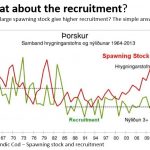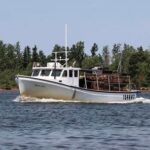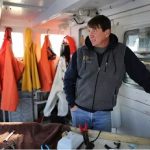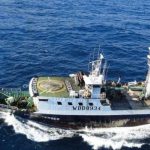Category Archives: Inland Fisheries
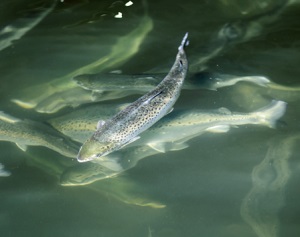
Pure Salmon to invest $228 million in Southwest Virginia
Pure Salmon will invest about $228 million in Southwest Virginia, which is one of the largest private capital investments in the area’s history, according to officials in Russell, Buchanan, and Tazewell counties. The construction of “Project Jonah” will be the world’s “largest vertically integrated indoor aquaculture facility.” The facility will raise and process up to 20,000 tons of salmon annually. >click to read< 12:51
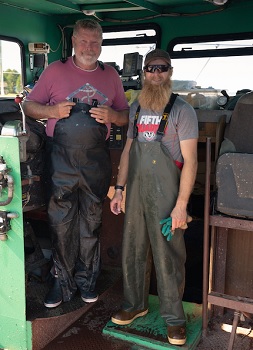
Know Your Fisherman: Henriksen Fisheries
The bountiful waters of Lake Michigan surround Door County, making it home to a vibrant fishing community that dates back to the mid-1800s. That community today includes several larger commercial fishing operations, including Henriksen Fisheries. The fishermen, Charlie and Will Henriksen, along with two year-round and several part-time employees. Henriksen, who’s from the Chicago area, got his first taste of Door County fishing some 40 years ago when he was recruited to help ice fish one winter. He arrived in the county at age 20 to assist his father, who had bought an old hotel in Ellison Bay, and, as the story goes, he never left. >click to read< 11:34
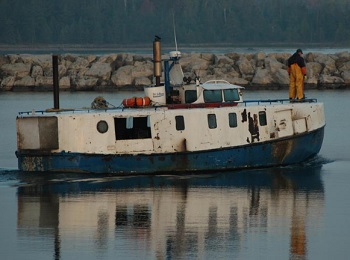
Congress gave $300 million to help fisheries. The Great Lakes got zero. Why were they left out?!
The nationwide shutdown was especially ill-timed for fishers in the Great Lakes. “We had reports of commercial fishermen in Michigan who had a catch with absolutely nowhere to sell it,” Luckily, there was a plan in place to help commercial fishers and charter boats. But when it came time to distribute that funding, most of the Great Lakes states were left out altogether. That came as a shock to many fishers. “Right up until the final hour, a lot of the Great Lakes fishery participants thought that they were going to be included,” says Gravelle. Why the Great Lakes were left out? >click to read< 14:53
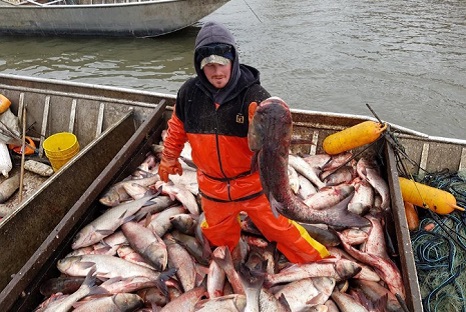
Asian carp processing facility might be headed to North Peoria
A former government adviser and official, Brian Colgan, leads a company that intends to convert a 4,000-square-foot building at 8606 N. Pioneer Road into an Asian carp processing, packaging and distribution facility. There the fish would be fashioned into bait for domestic crab, crawfish and lobster harvesters on all coasts. “Our company, Colgan Carp Solutions Inc., by creating these markets and working with others in the area who want to do the same, can drive up demand, can reduce the population in the Illinois River and hopefully create some jobs, economic opportunity and show that there’s a market-driven strategy for invasive-species management,” Colgan said. >click to read< 11:33
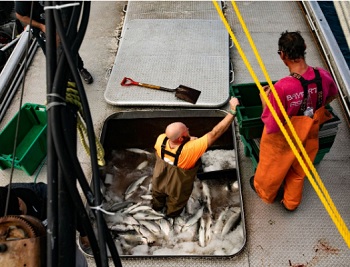
Commercial fishing sails into final chapter
The final nail in the coffin? According to the news, the traditional mom-and-pop style operations would move out of the Great Lakes for good, and leave the door open only for large, investor-style operations to take over the industry. “What it does, it finally just chokes us out,” said Amber Peterson, operator of The Fish Monger’s Wife, one of the remaining commercial fisheries. “It doesn’t even offer us the dignity of a quick death.” >click to read< stories related to this post, >click here< 10:15

Michigan’s dying commercial fishing industry fears state fishery bills will be final nail in the coffin
The once vibrant commercial fishing industry in Michigan has dwindled down from thousands of businesses to just 13 full-time fisheries. And those that are left are afraid legislation in a state Senate committee could be the end of the industry all together. That their mom-and-pop style operations would move out of the Great Lakes for good, and leave the door open only for large, investor-style corporations to take over the industry. This is all part of an ongoing battle in the Great Lakes between commercial fishing and sport fishing. >click to read< 15:02

Offshore Wind Farms are new danger for Lake Erie through Governor Cuomo’s Green New Deal
The proposal to install offshore wind turbines on the Eastern side of Lake Erie was brought to my attention during the annual Woodlawn Beach cleanup last September. Since then I have learned much about how negative this would be for Lake Erie and the people and wildlife that depend on it, the protests around the world against these types of projects and the media paywalls that are stifling our knowledge of them. Global developers have called the Great Lakes the “Saudi Arabia of Wind,” and surprisingly, the Sierra Club and other environmental groups that oppose Peace Bridge reconstruction and shoreline development endorse the turbines. Can you see the dollar signs? Can you trust a global industry with our fresh water? By Mary Henson, >click to read< 14:22
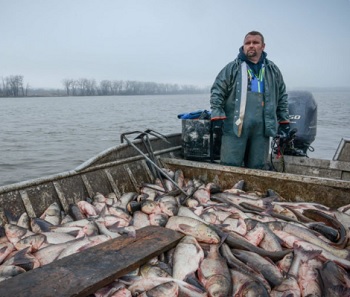
Carpe Carp
Clint Carter’s first catch of the day jumps right into his boat before he’s laid an inch of net. Another four or five silver carp make the leap in the time it takes Carter and his partner, Dave Buchanan, to scout out the best fishing grounds on that morning’s stretch of the Illinois River. The motor of their  steel-sided skiff startles the silvers enough to send them shooting out of the water in unpredictable parabolas. The motor of their steel-sided skiff startles the silvers enough to send them shooting out of the water in unpredictable parabolas. Once the men near a dense shoal of fish, the commotion reaches a fever pitch, like popcorn in a hot pan. Buchanan strategically twists and turns the boat, as Carter lets hundreds of yards of trammel nets off the stern. >click to read, photos< 13:46
steel-sided skiff startles the silvers enough to send them shooting out of the water in unpredictable parabolas. The motor of their steel-sided skiff startles the silvers enough to send them shooting out of the water in unpredictable parabolas. Once the men near a dense shoal of fish, the commotion reaches a fever pitch, like popcorn in a hot pan. Buchanan strategically twists and turns the boat, as Carter lets hundreds of yards of trammel nets off the stern. >click to read, photos< 13:46
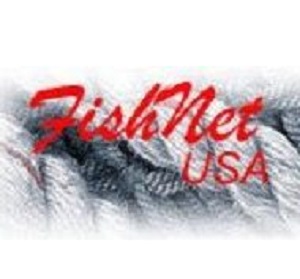
An East Coast Perspective on Coronavirus Impacts
This was initially to be about how the New Jersey commercial fishing industry was coping with the coronavirus crisis. However, there is a seemingly infinite number of websites running commentaries on the national and/or international aspects of the ongoing pandemic in general and, surprisingly, as it specifically applies to and as it affects commercial fishing and the seafood industry. Considering this, sharing more than an overview of what the New Jersey industry, or at least that part of it that I have been in touch with, would probably not have much of an impact. But happily, at this point it seems that U.S. consumers aren’t really as averse to preparing quality seafood at home (when it isn’t available or is only limitedly available elsewhere) as most of us have believed. >click to read< By Nils Stolpe 12:05

NOAA – Their mission
Back in the sixties when I was fishing with my dad we would fish about a one hundred miles east of New Bedford for whiting in the spring. We had a ninety foot dragger. And there were Russian vessels there that were three hundred foot and they were using a small mesh net that caught everything in the water. At the time there was no 200 mile limit. The Russians and other foreign vessels could come into our waters and were restricted to within fifteen miles of our coast. Today no one knows how much damage they did but our fisherman would eventually pay the price. Finally in 1978, we enacted the 200 mile limit. That was great so we thought, but we created a monster. That being NOAA. >click to read< Thank You, Sam Parisi 08:52
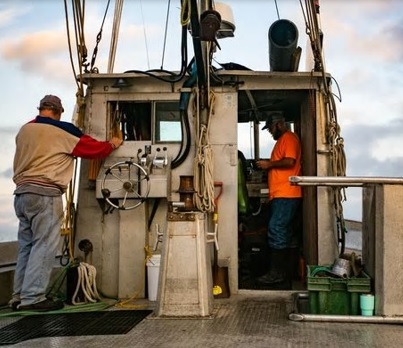
Inland Commercial Fisheries: Commercial fishing falls due to Coronavirus restrictions on restaurants says Bay Port Fish Company
One of Michigan’s traditional industries is facing a changing tide during the COVID-19 crisis. Commercial fishing operations like the Bay Port Fish Co. are seeing a dramatic decrease in wholesale demand, leading them to have to adjust their strategy this season. Lakon Williams of Bay Port Fish Co. said the fall off is due to restrictions on restaurants under Gov. Gretchen Whitmer’s executive orders. Another problem for Bay Port Fishing Co. is that they are set up in a old-school manner. Fish are normally hand filleted at their facility in a close-quarters workspace. 50 photo’s. >click to read< 10:51
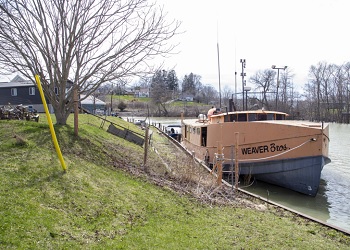
Coronavirus devastating commercial fishing industry
Lifelong commercial fisherman Mark Weaver had anticipated a bumper season for his family-run commercial fishery before the COVID-19 pandemic left the industry almost dead in the water. Now, he and the rest of Ontario’s commercial fishing industry are facing a bleak future that could leave them struggling just to survive. “I don’t know how we’re going to pay the bills,” Weaver said. While Lake Erie would normally be dotted with commercial fishing vessels at this time of year, their boats aren’t leaving the docks in Port Stanley, Wheatley and other Southwestern Ontario ports this spring since there’s nowhere to sell their catch. “It’s a total supply chain challenge and crisis that we’re in,” said Jane Graham, executive director of the Ontario Commercial Fisheries’ Association. April has been one of the “most productive fishing months of the year,” Graham said. And it looked like this April would have been just as productive, Weaver said. >click to read< 22:01
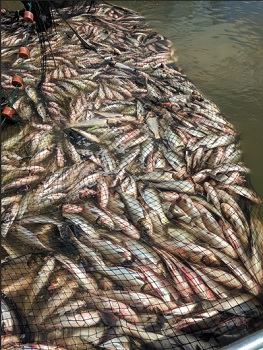
Asian Carp Fishing Method Being Tested In Kentucky
A commercial fisherman harvested close to 60,000 pounds of Asian carp from one bay in 48 hours as part of a fishing method being tested in Kentucky for the first time. Often referred to as either haul seining or beach seining, the method involves running a net out into the bay and scooping fish to the bank, hauling the net in with a winch and by hand. Wade Robbins, owner of Robbins Fishery, conducted the test in Kentucky Lake’s Pisgah Bay from the afternoon of March 19 to the morning of March 21. “It’s new in Kentucky,” Robbins said. “It’s been used for probably a century. It’s been perfected by the guys out of Browning, Ill., to use for Asian carp.” >click to read< 12:57

With Coronavirus pandemic ravaging our country, temporary relaxation of fishery regulations is urged to help fishing industry
Thanks to our Senators and Congressmen who worked to get specific aid to the fishing industry, that has been hit particularly hard by the closure of restaurants, where 70 per cent of seafood in this country is consumed. Fishermen and wholesalers have had to adapt on the fly and find other ways to market their product to various degrees of success. The closure of so many vital aspects of our domestic economy will have effects that will still be felt a long time after the Virus is tamed.,, I am requesting that NMFS immediately contact the various management councils and commissions to request that special meetings [webinars] of fishery advisory panels be held to discuss the pro’s and cons of this idea, and what fisheries could benefit.,,, By Jim Lovgren. >click to read< 20:48
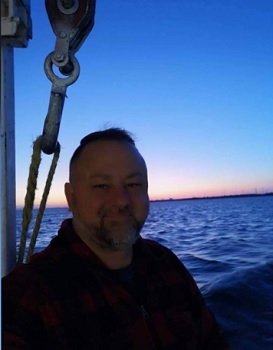
Missing Port Dover, Ontario fisherman embraced sunrises and the water
Fisherman Michael Smith lived for the mornings he could venture on to the water with the Donna F and watch the sunrise, according to cousin and fellow fisherman, James Misner. “There’s no trees and nothing in our way. It comes right over the water and we get to see a beautiful, perfect sunrise every morning.” “We’d go on there and say ‘good morning, Port Dover! It’s 5:30 a.m. Look at the sun coming up over the water,’ and a ‘we love our town’ type of thing.” On Monday, Smith set out early on the Donna F and did not return. >click to read< 06:46:16
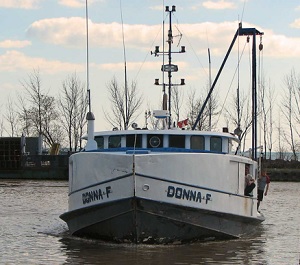
Commercial Fisherman lost in Lake Erie after going overboard
Divers from the OPP are searching Lake Erie for a man who is missing after going overboard from a commercial fishing vessel Monday morning. The incident happened about 13 kilometres west of Long Point around 10:15 a.m. The fisherman is being identified as Michael Smith, of Port Dover, Ontario from the fishing tug Donna F. “He was loved by all and had an amazing number of friends amongst the fishermen and Port Doverites alike,” photo, boatnerd.com >click to read< 19:11
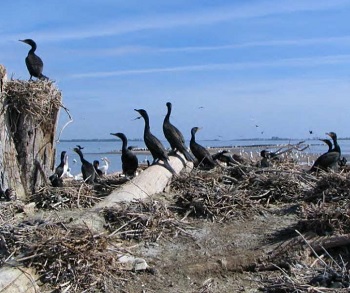
Cormorants damaging fish populations
It is estimated there are about 230,000 double-crested cormorants around the Great Lakes, each eating an estimated 1.3 to 1.6 pounds of fish a day. That equals more than 77 million pounds of fish per year, according to a report from the Michigan Department of Natural Resources. The birds eat minnows, alewives, shad, round gobies, other prey-fish, and they also devour significant numbers of yellow perch, stocked trout, salmon, walleye, pike, and panfish. “Cormorants are uncontrolled and wreaking havoc on our Great Lakes,” said Lakon Williams, who manages the Bay Port Fish Company. “Since the Zebra Mussel invasion, the lakes and the water are cleaner than ever.” >click to read< 15:43
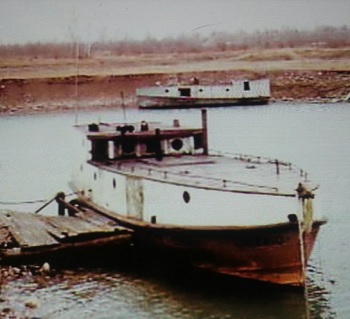
A February fishing adventure
Can you imagine spending 15 hours out on Lake Michigan on a day like today? Me neither. But many commercial fishermen here did just that in the mid-20th century, if they could maneuver through the ice floes. Tucked away in the archives of the Kenosha History Center is a letter written by Kenoshan LeRoy Nohling, dated Feb. 14, 1931. LeRoy, 24, related his experience of that week: “Nathan, my cousin, called up about midnight the night before to suggest that as long as neither of us were working, we might as well take a trip on one of the fishing boats here in the harbor. At six in the morning, we were down at the pier looking ‘em over.,, Off to the fishing grounds! >click to read< 19:32
1937 lake tragedy kills Kenoshans on the Marold II – This is the second part of a two-part series. Sunday’s first installment of this month’s Old Kenosha focused on the commercial fishing trade here in 1931 as told by a young man who joined the crew of the Marold II for a day. >click to read<
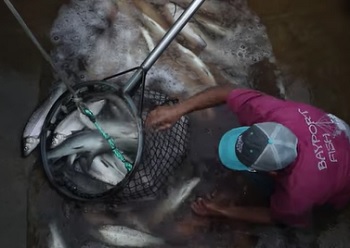
Michigan House Bills Ban Commercial Perch Fishing on Great Lakes
Lakon Williams of the Bay Port Fish Co. expressed her concern. The company nets whitefish and perch in Saginaw Bay and Lake Huron. “I knew that that was going to happen, unfortunately we’ve been trying since the summertime to get through to the House of Representatives that this isn’t what we want and this isn’t what we need, and that this will put us out of business. It’s just kind of fallen on deaf ears,” she said. Video, >click to read< 10:16
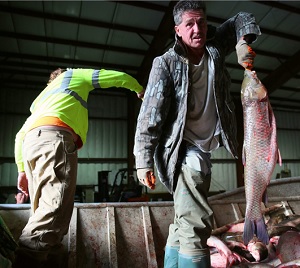
Asian Carp: Chinese investment and wisdom rescue Kentucky’s fisheries
As New Year 2020 nears, 62-year-old Angie Yu is marketing her fish products harder than usual. The Chinese American businesswoman views the holiday season as a prime opportunity for the delicacies to gain wider popularity.The entrepreneur prides herself on her choice of location. As the name Two Rivers Fisheries indicates, her plant sits on the confluence of two rivers-the Mississippi and its major tributary, the Ohio., After receiving carp from local fishermen, the plant processes, flash-freezes and boxes up the fish before shipping them out to destinations across the globe. >click to read< 10:15
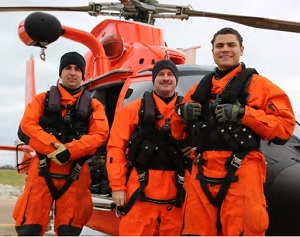
U.S., Canadian coast guards rely on each other to save lives
Snowy, dark and difficult to see from a few hundred feet in the air — U.S. Coast Guard search and rescue pilot Lieutenant Aaron Jones recalls responding to three medical emergencies on Pelee Island, in southwestern Ontario, in the span of a month. In those cases, the U.S. Coast Guard Air Station Detroit was best suited to respond, highlighting the importance of the relationship between both countries’ coast guards. >click to read< 09:28

Video: Maine lobstermen look to Asian Carp as potential solution for bait crisis
“My bait bill today was ridiculously high, I think. But there’s people that spend more,” said Lobsterman Steve Train. The rising costs are credited to increased demand, but also new regulations that limit the catch for one of the most popular fish for lobstering – herring. “The reality is it’s not the just the price, it’s the availability. Without the herring coming on to put in the bait bags to catch lobsters… we’re going to have a bait shortage,” said Train. The state estimates a nearly a 50,000,000 pound herring gap in the next year. >Video, click to read< 11:19
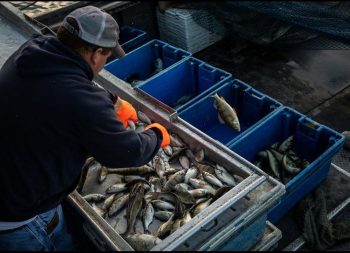
In the Great Lakes’ most productive fishing grounds, algae-fueled dead zones are eroding livelihoods
From his lakefront dock in Crystal Rock, 70 miles west of Cleveland, Dean Koch still gleefully reminisces on his career as a commercial fisherman in the heyday. At his first industry meeting in Sandusky in the late 1960s, fishing moguls booked the entire Holiday Inn and filled all the rooms. Back then, fishermen set hundreds of miles of gill nets and thousands of trap nets in Lake Erie.,, Now, Koch, 70, says, the number of fishermen who hold commercial licenses could sit around the small round table in his garage. >click to read< 08:22
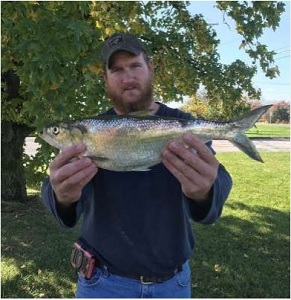
Herring in Missouri? Hell Ya! Angler ties state record with 3-pound fish
Bryant Rackers is in the Missouri fish record book — again. Rackers, of Bonnots Mill, caught a 3-pound skipjack herring on the Osage River on Oct. 27, a fish that tied the current Missouri record for skipjack herring. According to the U.S. Fish and Wildlife Service, people do eat skipjack herring, “but they are generally considered a ‘rough fish’ because they are difficult to debone.’ “These fish are caught by commercial fisherman,,, >click to read< 13:06

A reminder from Sam Parisi to those interested in creating and implementing a U.S. Fish Bill
Greetings to all commercial fishermen, fish processors, equipment suppliers, politicians, and citizens, that are interested and supportive of creation of the U.S. Fish Bill. It is important that we create an atmosphere of unity and inclusion for all to reach out to their political representation, and inform them of need for a major Bill supporting all segments of the U.S. Fishing industry, and ask that they get involved. I am asking Senator Bruce Tarr, and Rep. Ann-Margaret Ferrante to attend. The meeting will be held at the Gloucester City Hall November 21 at 7 pm. For developing info, and input of idea’s, please call me! Thank you, and best regards! Sam Parisi, Gloucester Mass. at 978 491 7722 06:45
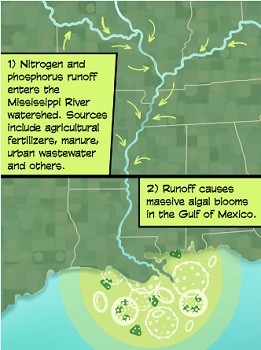
Midwestern Farm Runoff Creates Headache For Louisiana Shrimpers
“We’re not catching no large shrimp,” said Olander, who largely blames worsening environmental conditions. “There’s no explaining this here other than it’s something’s wrong with our water.” Olander grabs his phone to elaborate. He pulls up a picture of the Gulf water his cousin Douglas, also a fisherman, took from the deck of his boat earlier this summer. “That’s that green slime,” he said, pointing. “ Audio, >click to read< 11:43
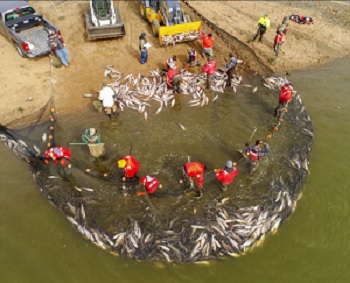
Asian carp: Turning a nuisance into a commodity for the Great Lakes
One of the great myths about Asian carp is that the war against them will be won if the Great Lakes region succeeds in keeping them out of Lake Michigan. Indeed the stakes are high in that part of the Midwest, including in communities that wrap around the fertile fishing waters of Lake Erie’s western basin, and the rivers that feed into the lake.,, But the Great Lakes are the site of only one battle in the Asian carp war, and environmental experts contend there is no apparent end in sight to what has evolved over several decades into a slow-moving biological disaster cutting across the heart of North America, Video, photo’s, >click to read< 17:20
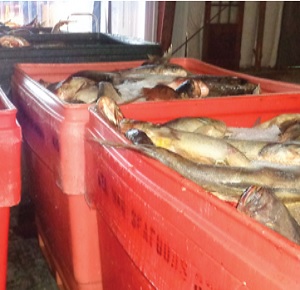
Industrial Park Will Be Dedicated To Processing Asian Carp
Construction on Ballard County, Ky.’s new International Fisheries Industrial Park is underway, with four Chinese companies that process Asian carp having already closed on lots. Two more companies have signed agreements, with sales of those lots expected to be finalized soon. The sales create the first commercial park dedicated to the processing of Asian carp anywhere in the United States. “It’s really neat to see how all of this has played out,” Ballard County Judge-Executive Todd Cooper said. >click to read< 15:32
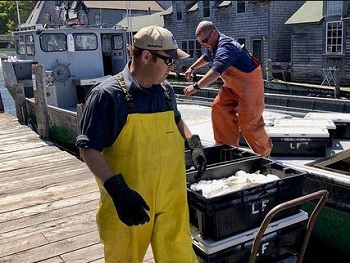
Great Lakes Recreational Grab-Bills would squeeze commercial fishermen, help sportsfishermen
Michigan House lawmakers last week advanced legislation to tighten regulations on Great Lakes commercial fishers, escalating a fight between the long-declining industry and sportfishing groups. The legislation would increase commercial fishing license fees from about $200 to $1,400; exponentially boost fines, tighten reporting requirements on commercial catches and how fishermen tend their nets… The biggest area of contention: The bills also will codify into law a current Department of Natural Resources ban on commercial harvesting of lake trout, walleye, yellow perch and other game fish, reserving them exclusively for anglers. > click to read< 19:06:16
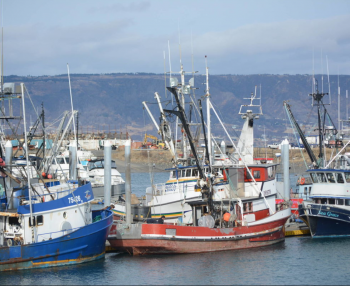
Congress considering safety, climate change for fisheries
Congress is getting involved in fisheries in a couple key areas: safety and climate change. The FISH SAFE Act, and, Climate Ready Fisheries Act of 2019. Republican Rep. Don Young is leading a bipartisan effort along with Rep. Jared Golden (D, Maine) to improve safety, introducing the Funding Instruction for Safety Health, and Security Avoids Fishing Emergencies Act.,,, The most recent climate change legislation, also bipartisan, was introduced by Rep. Joe Cunningham, (D- S.C), and is co-sponsored by Reps Brian Mast (R-Fla.), Francis Rooney (R-Fla.) and Jared Huffman (D-Calif.), and is meant to help “low country” fishermen, but the impact, should it pass, would presumably help fishermen nation-wide. >click to read< 21:51


































